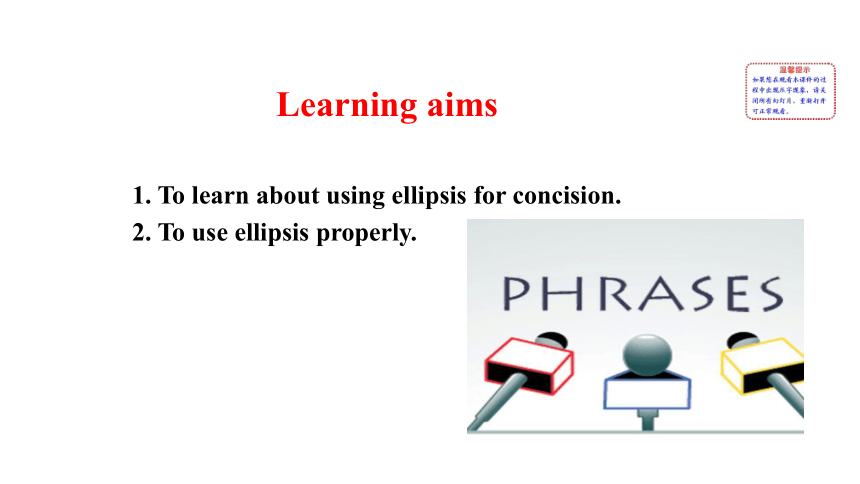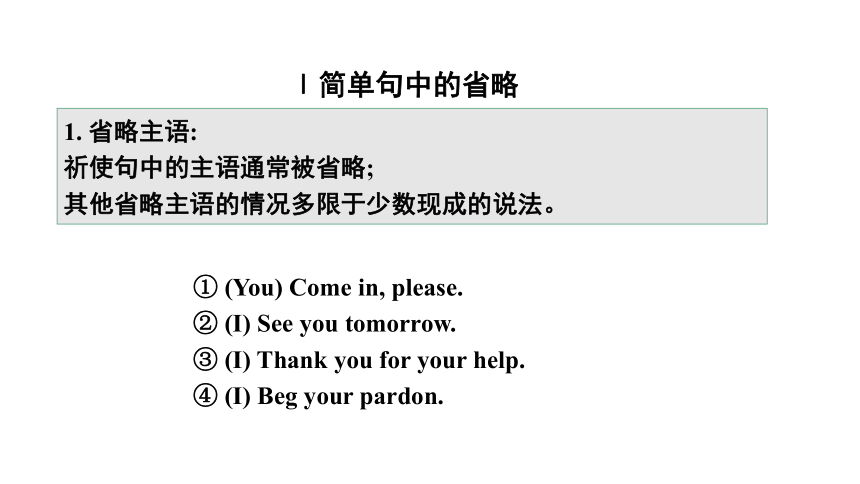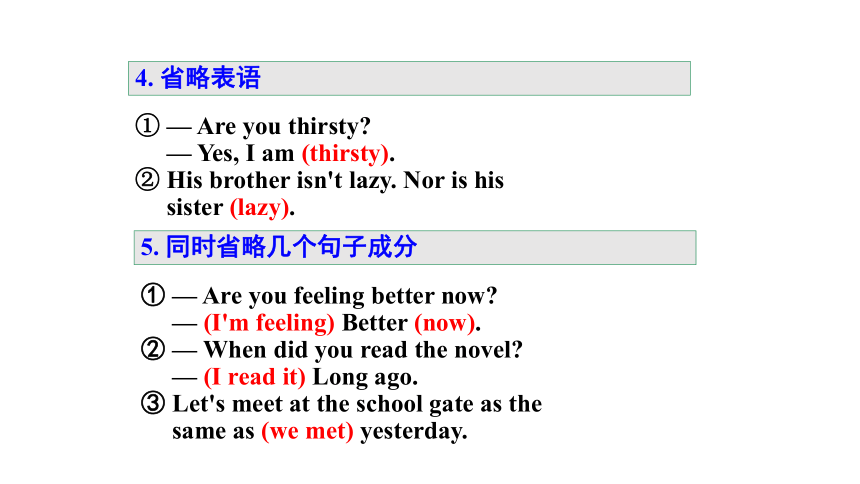Unit 3 Diverse cultures-Period 3 Discovering Useful Structures课件(共30张PPT)
文档属性
| 名称 | Unit 3 Diverse cultures-Period 3 Discovering Useful Structures课件(共30张PPT) |  | |
| 格式 | ppt | ||
| 文件大小 | 1.3MB | ||
| 资源类型 | 教案 | ||
| 版本资源 | 人教版(2019) | ||
| 科目 | 英语 | ||
| 更新时间 | 2024-11-14 20:39:37 | ||
图片预览












文档简介
(共30张PPT)
Period 3 Discovering Useful Structures
Unit 3 Diverse Cultures
1. To learn about using ellipsis for concision.
2. To use ellipsis properly.
Learning aims
Leading-in
Excuse me!
Yes
Is this your handbag
Pardon
Is this your handbag
Yes, it is.
Thank you very much.
这段简短的对话中都省略了哪些词呢?
Watch and Observe
(my handbag)
(I beg your)
Excuse me!
Yes
Is this your handbag
Pardon.
Is this your handbag
Yes, it is
Thank you very much.
(You)
(I)
.
Have a
Observe the following sentences and pay attention to the red parts.
1. A: Oh, I just love nachos! (They are) Mexican corn chips covered in Cheese!
B: Me too. / I love nachos, too.
2. A: So it's the food of many different cultures, (and they are) all in one dish
B: Exactly (, it's the food of many different cultures, and they are all in one dish).
3. (There is) a real mix of cultures here!
4. (I) can't wait (to go there)!
Please underline the words that can be left out.
1. A: Oh, I just love nachos! They are
Mexican corn chips covered in Cheese!
B: Me too. / I love nachos, too.
2. A: So it's the food of many different
cultures, and they are all in one dish
B: Exactly, it's the food of many
different cultures, and they are all in
one dish.
3. There is a real mix of cultures here!
4. I can't wait to go there!
省略是为了避免重复、突出新信息并使上下文紧密连接的一种语法修辞手段。省略在语言中, 尤其在对话中, 是一种十分普遍的现象。
Grammar:ellipsis
省略前提: 主谓宾, 定状表, 如有重复可删掉。
省略原则: 词语省略后, 不致令人费解。
① (You) Come in, please.
② (I) See you tomorrow.
③ (I) Thank you for your help.
④ (I) Beg your pardon.
Ⅰ简单句中的省略
1. 省略主语:
祈使句中的主语通常被省略;
其他省略主语的情况多限于少数现成的说法。
① (It) Sounds a good idea.
② (Will you) Have a smoke
③ (Would you like) Something to drink
④ (You come) This way, please.
2. 省略主谓语或主谓语的一部分
3. 省略宾语
① — Do you know Miss Hu
— I don't know (her).
② Tom enjoys dancing, but Peter hates
(dancing).
可以省略宾语的全部
① Don't touch anything unless the teacher tells you to (touch).
② —Are you a teacher
—No, but I want to be (a teacher).
③ — He hasn't finished the task.
—Well, he ought to have (finished it).
可以省略作宾语的动词不定式, 只保留to, 但如果该宾语是动词be或完成形式, 则须在to后加上be或have。
① — Are you thirsty
— Yes, I am (thirsty).
② His brother isn't lazy. Nor is his
sister (lazy).
4. 省略表语
① — Are you feeling better now
— (I'm feeling) Better (now).
② — When did you read the novel
— (I read it) Long ago.
③ Let's meet at the school gate as the
same as (we met) yesterday.
5. 同时省略几个句子成分
两个并列分句中,后一分句常省略与前一分句中相同的部分。
① Mike said that he would come to school to see me the next day, but he didn't (come to school to see me the next day).
② Lin's father was not at home, but his mother was (at home).
③ She was poor but (she was) honest.
Ⅱ并列句中的省略
1. 主句中的省略
(1) 主句的省略多见于句首,多用于口语。
(It's a) Pity you couldn't come.
(2) 在对话中答句省去整个主句只用从句。
— Shall I go to play
— If you like (you can go to play).
Ⅲ 复合句中的省略
2. 宾语从句中的省略
(1) 由which, when, where, how和why引导的宾语从句,可全部或部分省去,只保留引导词。
Please pass me one of these books and I don't care which (you pass me).
(2) 在I'm afraid, I think, I believe, I hope, I guess等开头的作答句中,后面跟so与 not分别用于肯定或否定宾语时,宾语从句可省去。
— Do you think it will rain
— I hope not (that it will not rain).
3. 状语从句中的省略
(1) 状语从句出现在句末时,一般都可以作句尾省略。
① John will go if Mary will (go).
② You can ask me questions if (there are) any (questions).
(2) 有时条件从句可以完全省去,只剩下主句。
I would have come yesterday (if I had wanted to).
(3) 以as, than引导的比较状语从句可以全部或部分省去。
After half an hour, she became quieter (than she had been).
(4) 在表示时间、地点、条件、让步等的状语从句中,从句的主语如与主句的主语相同,常省略从句的主语和谓语。
① When (you are) crossing the road, you'd better look at both sides.
② Unless (I am) invited I will not go.
③ While (he was) on a walking tour with his wife, he stooped to talk to a workman.
1. that的省略
(1) 宾语从句中常省略that, 但多个宾语从句并列时, 通常只省略第一个that。
He said (that) the text was very important and that we should learn it by heart.
(2) 定语从句中that作宾语时可以省略。
The book (that) I borrowed yesterday was hers.
Ⅳ 其他省略
2. 不定式符号to的省略
(1) 并列的不定式可省去后面的to。
The boy did nothing but play.
(3) 介词but前若有实义动词do, 后面不定式不带to。
①I will help (to) do it for you.
②I will help you (to) do it.
(2) help当“帮助”讲时,后面的宾语或宾补的不定式符号to可带可不带。
I told him to sit down and wait for a moment.
① I saw the boy fall from the tree.
② The boy was seen to fall from the tree.
③ The boss made us work 12 hours a day.
④ We were made to work 12 hours a day.
(4) 某些使役动词(let, make, have)及感官动词(see, watch, hear, notice, observe, feel, look at, listen to等)后面作宾语补足语的不定式一定要省去to, 但在被动语态中须将to复原。
(5) 主语从句中有实义动词do, 后面作表语的不定式的to可带可不带。
What we can do now is (to) wait.
3. 条件从句中有should, were或had时, 可以省略if, 但要将should, were或had提至句首。
If I were you, I would give it up.
Were I you, I would give it up.
1. signs/labels
No parking.
(No parking is allowed here.)
Quiet!
(You should be quiet here.)
2. newspaper headlines
Turandot on stage.
(The opera Turandot is being performed
on stage.)
Ⅴ 一些特殊结构中的省略
3. instructions
Do not bend!
(Do not bend this envelope.)
4. postcards/diaries
Best wishes.
(I give you my best wishes.)
5. notes
Opera OK, costumes great.
(The opera was OK, and the costumes were great.)
if you want to
what it used to be
Though tired
When asked
Though not large
【即学即练】Ⅰ完成句子
Ⅱ语法填空
so
to
completed
to be
being put
so
to
expected
angry
heated
省略
概念
为了避免重复、突出新信息并使上下文紧密连接的一种语法修辞手段。
1. 简单句
(1)省略主语: 祈使句中的主语通常被省略; 其他省略主语的情况多限于少数现成的说法。(2)省略主谓语或主谓语的一部分(3)省略宾语(4)省略表语(5)同时省略几个句子成分
2.并列句
两个并列从句中,后一分句常省略与前一分句中相同的部分
3. 复合句:
(1)主句的省略多见于句首,多用于口语;在对话中答句省去整个主句只用从句。
(2)宾语从句及状语从句的省略
4.其它情况:that的省略;不定式符号to的省略;条件从句中有should, were或had时, 可以省略if, 但要将should, were或had提至句首。
可省略的情况
Summary
(1)Haven’t seen you for ages.
____________________________
(2) Some more tea
____________________________
(3) Sounds like a good idea.
____________________________
(4) Doesn’t matter.
____________________________
(5) Sorry to hear that.
____________________________
I haven’t seen you for ages.
Would you like some more tea
That/It sounds like a good idea.
1. Find out what have been left out.
It doesn’t matter.
I’m sorry to hear that.
Exercise
(6)Pity you couldn’t come.
________________________________
(7) This way, please.
________________________________
(8)Terrible weather!
________________________________
(9)Joining us for a drink
________________________________
(10)Going to the supermarket
________________________________
It’s / What a pity you couldn’t come.
Step / Come this way, please.
What terrible weather it is!
Are you joining us for a drink
Are you going to the supermarket
(1)我的朋友唱歌,而我不唱歌。 ________________________________ (2)一旦出版,这部小说将成为今年的畅销书之一。 ____________________________________________________________
(3)过马路要小心。 ___________________________________________________ (4)我只能按照别人告诉我的方法去做。 _____________________________________________________ (5)— 那袋子沉么? — 不很沉。 _______________________________________________
My friend sings, but I don’t (sing).
2. Translate the sentences.
When (it is) published, the novel will become one of the best sellers
When (you are) crossing the road, (you must) be careful.
I can only do it (the way) as (I was) told (to do it in that way).
— Is that bag heavy — (It’s) Not very (heavy).
of the year.
Nothing is difficult to the man who will try. 世上无难事,只要肯登攀。
Period 3 Discovering Useful Structures
Unit 3 Diverse Cultures
1. To learn about using ellipsis for concision.
2. To use ellipsis properly.
Learning aims
Leading-in
Excuse me!
Yes
Is this your handbag
Pardon
Is this your handbag
Yes, it is.
Thank you very much.
这段简短的对话中都省略了哪些词呢?
Watch and Observe
(my handbag)
(I beg your)
Excuse me!
Yes
Is this your handbag
Pardon.
Is this your handbag
Yes, it is
Thank you very much.
(You)
(I)
.
Have a
Observe the following sentences and pay attention to the red parts.
1. A: Oh, I just love nachos! (They are) Mexican corn chips covered in Cheese!
B: Me too. / I love nachos, too.
2. A: So it's the food of many different cultures, (and they are) all in one dish
B: Exactly (, it's the food of many different cultures, and they are all in one dish).
3. (There is) a real mix of cultures here!
4. (I) can't wait (to go there)!
Please underline the words that can be left out.
1. A: Oh, I just love nachos! They are
Mexican corn chips covered in Cheese!
B: Me too. / I love nachos, too.
2. A: So it's the food of many different
cultures, and they are all in one dish
B: Exactly, it's the food of many
different cultures, and they are all in
one dish.
3. There is a real mix of cultures here!
4. I can't wait to go there!
省略是为了避免重复、突出新信息并使上下文紧密连接的一种语法修辞手段。省略在语言中, 尤其在对话中, 是一种十分普遍的现象。
Grammar:ellipsis
省略前提: 主谓宾, 定状表, 如有重复可删掉。
省略原则: 词语省略后, 不致令人费解。
① (You) Come in, please.
② (I) See you tomorrow.
③ (I) Thank you for your help.
④ (I) Beg your pardon.
Ⅰ简单句中的省略
1. 省略主语:
祈使句中的主语通常被省略;
其他省略主语的情况多限于少数现成的说法。
① (It) Sounds a good idea.
② (Will you) Have a smoke
③ (Would you like) Something to drink
④ (You come) This way, please.
2. 省略主谓语或主谓语的一部分
3. 省略宾语
① — Do you know Miss Hu
— I don't know (her).
② Tom enjoys dancing, but Peter hates
(dancing).
可以省略宾语的全部
① Don't touch anything unless the teacher tells you to (touch).
② —Are you a teacher
—No, but I want to be (a teacher).
③ — He hasn't finished the task.
—Well, he ought to have (finished it).
可以省略作宾语的动词不定式, 只保留to, 但如果该宾语是动词be或完成形式, 则须在to后加上be或have。
① — Are you thirsty
— Yes, I am (thirsty).
② His brother isn't lazy. Nor is his
sister (lazy).
4. 省略表语
① — Are you feeling better now
— (I'm feeling) Better (now).
② — When did you read the novel
— (I read it) Long ago.
③ Let's meet at the school gate as the
same as (we met) yesterday.
5. 同时省略几个句子成分
两个并列分句中,后一分句常省略与前一分句中相同的部分。
① Mike said that he would come to school to see me the next day, but he didn't (come to school to see me the next day).
② Lin's father was not at home, but his mother was (at home).
③ She was poor but (she was) honest.
Ⅱ并列句中的省略
1. 主句中的省略
(1) 主句的省略多见于句首,多用于口语。
(It's a) Pity you couldn't come.
(2) 在对话中答句省去整个主句只用从句。
— Shall I go to play
— If you like (you can go to play).
Ⅲ 复合句中的省略
2. 宾语从句中的省略
(1) 由which, when, where, how和why引导的宾语从句,可全部或部分省去,只保留引导词。
Please pass me one of these books and I don't care which (you pass me).
(2) 在I'm afraid, I think, I believe, I hope, I guess等开头的作答句中,后面跟so与 not分别用于肯定或否定宾语时,宾语从句可省去。
— Do you think it will rain
— I hope not (that it will not rain).
3. 状语从句中的省略
(1) 状语从句出现在句末时,一般都可以作句尾省略。
① John will go if Mary will (go).
② You can ask me questions if (there are) any (questions).
(2) 有时条件从句可以完全省去,只剩下主句。
I would have come yesterday (if I had wanted to).
(3) 以as, than引导的比较状语从句可以全部或部分省去。
After half an hour, she became quieter (than she had been).
(4) 在表示时间、地点、条件、让步等的状语从句中,从句的主语如与主句的主语相同,常省略从句的主语和谓语。
① When (you are) crossing the road, you'd better look at both sides.
② Unless (I am) invited I will not go.
③ While (he was) on a walking tour with his wife, he stooped to talk to a workman.
1. that的省略
(1) 宾语从句中常省略that, 但多个宾语从句并列时, 通常只省略第一个that。
He said (that) the text was very important and that we should learn it by heart.
(2) 定语从句中that作宾语时可以省略。
The book (that) I borrowed yesterday was hers.
Ⅳ 其他省略
2. 不定式符号to的省略
(1) 并列的不定式可省去后面的to。
The boy did nothing but play.
(3) 介词but前若有实义动词do, 后面不定式不带to。
①I will help (to) do it for you.
②I will help you (to) do it.
(2) help当“帮助”讲时,后面的宾语或宾补的不定式符号to可带可不带。
I told him to sit down and wait for a moment.
① I saw the boy fall from the tree.
② The boy was seen to fall from the tree.
③ The boss made us work 12 hours a day.
④ We were made to work 12 hours a day.
(4) 某些使役动词(let, make, have)及感官动词(see, watch, hear, notice, observe, feel, look at, listen to等)后面作宾语补足语的不定式一定要省去to, 但在被动语态中须将to复原。
(5) 主语从句中有实义动词do, 后面作表语的不定式的to可带可不带。
What we can do now is (to) wait.
3. 条件从句中有should, were或had时, 可以省略if, 但要将should, were或had提至句首。
If I were you, I would give it up.
Were I you, I would give it up.
1. signs/labels
No parking.
(No parking is allowed here.)
Quiet!
(You should be quiet here.)
2. newspaper headlines
Turandot on stage.
(The opera Turandot is being performed
on stage.)
Ⅴ 一些特殊结构中的省略
3. instructions
Do not bend!
(Do not bend this envelope.)
4. postcards/diaries
Best wishes.
(I give you my best wishes.)
5. notes
Opera OK, costumes great.
(The opera was OK, and the costumes were great.)
if you want to
what it used to be
Though tired
When asked
Though not large
【即学即练】Ⅰ完成句子
Ⅱ语法填空
so
to
completed
to be
being put
so
to
expected
angry
heated
省略
概念
为了避免重复、突出新信息并使上下文紧密连接的一种语法修辞手段。
1. 简单句
(1)省略主语: 祈使句中的主语通常被省略; 其他省略主语的情况多限于少数现成的说法。(2)省略主谓语或主谓语的一部分(3)省略宾语(4)省略表语(5)同时省略几个句子成分
2.并列句
两个并列从句中,后一分句常省略与前一分句中相同的部分
3. 复合句:
(1)主句的省略多见于句首,多用于口语;在对话中答句省去整个主句只用从句。
(2)宾语从句及状语从句的省略
4.其它情况:that的省略;不定式符号to的省略;条件从句中有should, were或had时, 可以省略if, 但要将should, were或had提至句首。
可省略的情况
Summary
(1)Haven’t seen you for ages.
____________________________
(2) Some more tea
____________________________
(3) Sounds like a good idea.
____________________________
(4) Doesn’t matter.
____________________________
(5) Sorry to hear that.
____________________________
I haven’t seen you for ages.
Would you like some more tea
That/It sounds like a good idea.
1. Find out what have been left out.
It doesn’t matter.
I’m sorry to hear that.
Exercise
(6)Pity you couldn’t come.
________________________________
(7) This way, please.
________________________________
(8)Terrible weather!
________________________________
(9)Joining us for a drink
________________________________
(10)Going to the supermarket
________________________________
It’s / What a pity you couldn’t come.
Step / Come this way, please.
What terrible weather it is!
Are you joining us for a drink
Are you going to the supermarket
(1)我的朋友唱歌,而我不唱歌。 ________________________________ (2)一旦出版,这部小说将成为今年的畅销书之一。 ____________________________________________________________
(3)过马路要小心。 ___________________________________________________ (4)我只能按照别人告诉我的方法去做。 _____________________________________________________ (5)— 那袋子沉么? — 不很沉。 _______________________________________________
My friend sings, but I don’t (sing).
2. Translate the sentences.
When (it is) published, the novel will become one of the best sellers
When (you are) crossing the road, (you must) be careful.
I can only do it (the way) as (I was) told (to do it in that way).
— Is that bag heavy — (It’s) Not very (heavy).
of the year.
Nothing is difficult to the man who will try. 世上无难事,只要肯登攀。
